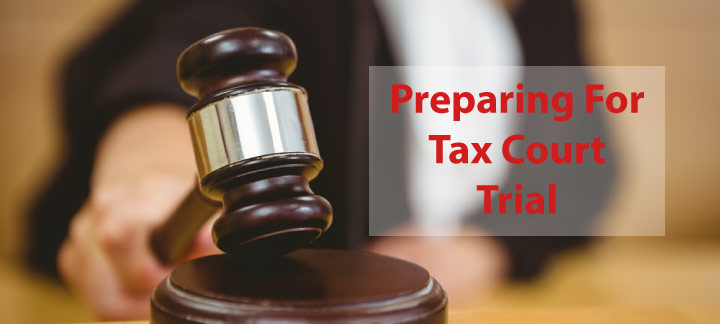Preparing for a Tax Court Trial
When your case is set for trial in the tax court, you will generally receive notice approximately five months prior to the trial date. The Tax Court provides ample notice to litigants so that they are able to pursue out-of-court settlements if they wish. In setting the trial date, the Tax Court will either issue a notice for S cases or a notice for regular tax litigation cases, and these notices typically contain information such as where and when to appear for the trial session. The Tax Court always attempts to schedule the trial in the preferred location of the taxpayer, but if no courtroom is available in that city, the Tax Court will schedule the trial in a city reasonably nearby.
How Should a Taxpayer Prepare for a Tax Court Trial?
When the trial date is set, the Tax Court issues a Standing Pretrial Order (1). The Standing Pretrial Order contains very specific instructions about preparing for the trial, so the taxpayer and his or her counsel should read it carefully. The Standing Pretrial Order also contains instructions to the taxpayer regarding how to potentially settle his or her case before trial, and how to stipulate facts if a settlement is not reached. One of the standard instructions set forth in the Standing Pretrial Order states that the parties should file a pretrial memorandum with the Tax Court. The pretrial memorandum should be filed with the court and exchanged with the other parties not less than 14 days before the first day of the trial session. Included in the pretrial memorandum should be the following information:
- The name of the case;
- The name of the attorneys involved;
- The amounts in dispute, along with the years, deficiency periods, and any additions or penalties;
- The status of the case;
- The current estimate of the trial time;
- Any motions that the taxpayer expects to make during the trial;
- The status of the stipulation of facts;
- The names of any witnesses that the taxpayer expects to call;
- A summary of facts;
- A brief synopsis of legal authorities; and
- Any evidentiary issues encountered by the taxpayer.
The pretrial memorandum is a useful tool because it assists the taxpayer in preparing his or her case as well as allows the Tax Court judge to understand the taxpayer’s position. After the pretrial memorandum is drafted, it should be sent to the Court and to the IRS attorney.
What is a Final Status Report in a Tax Court Trial?
A Final Status Report may be filed if there is a change in information or an omission of information that should have been included in the Pretrial Memorandum. As noted above, every party to a Tax Court case is required to submit to the court a pretrial memorandum containing an estimate of a probable settlement, probable trial, or definite trial, and an estimate of the trial time. A party should use the Final Status Report to address any changes from information represented in the Pretrial Memorandum. For example, if the taxpayer needs to inform the court of a settlement a case not previously reported to the court, then a Final Status Report should be used. Similarly, if the taxpayer needs to inform the court with final estimates of the likelihood or expected length of the Tax Court trial, and this information differs from the estimates provided in the pretrial memorandum, then the taxpayer should file a Final Status Report. Any time a Final Status Report is used, it should be filed with the Tax Court and the IRS by mail, fax, or electronic transmission no later than 3 p.m. Eastern time on the late business date before the start of the trial.
Checklist to Prepare for a Tax Court Trial
If your tax case is proceeding to trial, you should carefully review the instructions contained in the Standing Pretrial Order disseminated by the Tax Court. Some of these considerations are set forth below:
- Before you come to Court, think about the facts that you wish to share with the Tax Court judge;
- Organize any documents or evidence that support your case;
- Organize your facts and evidence that support your case, and think about how to best present that information to the Court;
- Provide the IRS with copies of the documents and evidence that you plan to use at trial;
- Agree in writing (the pretrial stipulation) the facts and documents that are not in dispute;
- If the IRS will not agree to your documents, bring several copies of the documents to court;
- Think about any witnesses that you may need to support your case;
- If you need witnesses to support your case, make sure that those witnesses are available to be present at the time and place of the trial;
- When the trial begins, come to the court early so that you will be ready when your case is called at the calendar call.
How a Tax Attorney Can Help with Your Tax Litigation
If you are contemplating a deficiency litigation, then you must consult with an experienced tax attorney. San Diego Tax Attorney William D. Hartsock has been successfully helping clients with tax issues since the early 1980s. Mr. Hartsock offers free consultations with the full benefit and protections of attorney client privilege to help people clearly understand their situation and options based on the circumstances of their case. To schedule your free consultation simply fill out the contact form found on this page, or call (858) 481-4844.
Tax Law References:
- https://www.ustaxcourt.gov/pro_se/SPTO_sample.pdf.



Comments (0)